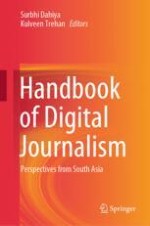2024 | OriginalPaper | Buchkapitel
45. Digital Media Content: Policies, Constitutions and Laws Across Countries
verfasst von : Ambrish Saxena
Erschienen in: Handbook of Digital Journalism
Verlag: Springer Nature Singapore
Aktivieren Sie unsere intelligente Suche, um passende Fachinhalte oder Patente zu finden.
Wählen Sie Textabschnitte aus um mit Künstlicher Intelligenz passenden Patente zu finden. powered by
Markieren Sie Textabschnitte, um KI-gestützt weitere passende Inhalte zu finden. powered by
